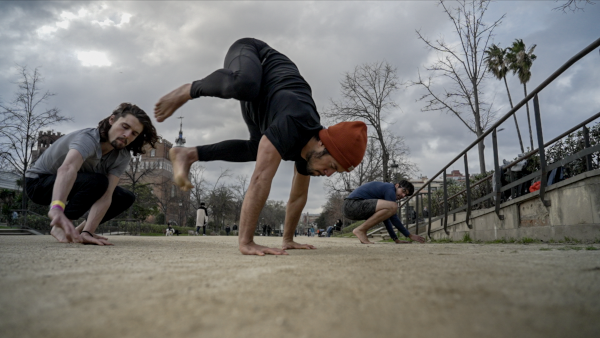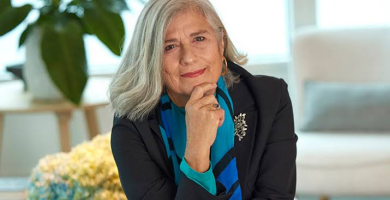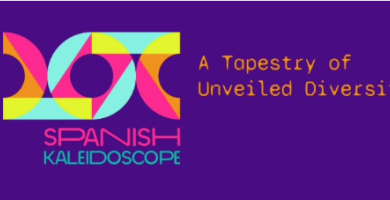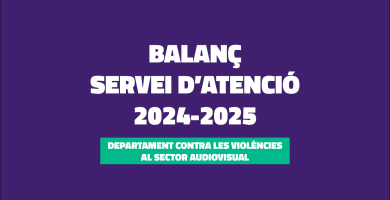
Alexia Kraft de la Saulx: “One person alone can change the world. That’s the idea I want to show with the documentaries I make”.
Alexia Kraft de la Saulx moved to Spain from Belgium with her family when she was three. Here she found her vocation in social documentaries. She won the London Eco Film Festival with her short film Robert’s Rooftop Farm. This short teaches us that we can use sustainability to improve the world. Robert has his own garden on the roof of his house in Barcelona and shares the vegetables he grows with his neighbours. We talk with her about this project.

Why did you decide to devote yourself to audiovisual?
First I did advertising in Brussels. I loved the artistic and creative side. I love doing things with my hands and seeing that there is a final result. But I’m not so keen on contributing to this society of selling more, doing more and making more. I don’t want to contribute to consumerism, but rather to doing things better and in the interests of people. I wondered how I could help people make their life a little better. I found a master’s degree called Interaction Design in Estonia and went to live there for two years. This master’s in interactive design really consists of helping improve the daily life of consumers, creating or adapting products or services. It’s not creating new things and telling them they have to consume, consume and consume, but rather telling them: “We’re interested in you; we want to know exactly how you use the product, what values you give it, why you use it in a certain way or why you don’t”. And we look for what works or what doesn’t and, depending on these values, we create a product or service which is much more adapted to them. This respected my values much more.
When I finished, I said to myself: “I love it, but I want something else”. I’ve always loved photography. Since I had my first camera at the age of 18, when I began my years in advertising, I always went out in the street at night to walk and take photos and when I went on a trip I always took it with me to make videos of my trips with my sister. That’s how I began to edit and I realized I liked it. When I finished the master’s degree I said to myself that I’d like to try to make documentary films because I like making videos which show positive solutions that a person or a group of people can use to make this a better world. I know that sounds really idealistic.
I love the documentary medium, but there’s so much which is based on negative aspects and problems without really providing a solution. I want to teach people that there are problems for which there are people who have solutions. That they may be small solutions like Robert’s, which can be adapted. One person alone can change the world. That’s the idea I want to show with the documentaries I make.
Did you study documentary filmmaking or are you self-taught?
After my two-year master’s degree, I came to Barcelona and studied in the production company Otoxo Productions. It was set up by two Englishmen in Barcelona about eight years ago. They offer vocational training. We are about 12 students and they teach the foundations of a documentary, but making it. We have a single exercise which is to make a documentary with 12 co-directors. You have to look for the subject, what associations or what characters are interesting, go and talk to them, do interviews, know whether there’s potential for a narrative. Then you have to analyse all this together, write the documentary and record it. Every two days, for example, we record in pairs; one has the camera and the other directs. You keep exchanging roles and in the end you have to review what you’ve recorded. You learn the whole process until you’ve produced the 30-minute documentary. Then they teach you to send it to festivals, to try to win awards or also earn money making it. At the end of this vocational training you make a documentary short alone which lasts a maximum of four minutes. That’s how Robert’s documentary came about.
How did you choose the subject? What motivated you about Robert’s story? How did you find out about him?
I’m a country person. I really miss everything to do with plants and gardens when I’m in the city. Whenever I was in my flat in Barcelona, I looked for seeds and planted them to make them grow or I planted avocados. In the end I had about 20 little plants on my balcony which were beginning to grow and which I distributed among my friends. I thought: “If I can do this, there must be other people who are doing it, but on a much larger scale”. And as I’m interested in this subject of growing your own vegetables at home, in such an urban place as Barcelona, I thought I could find someone doing more or less the same. When I started searching I found a video of Robert by a YouTuber who was interviewing him. I saw his Instagram, contacted him and directly, on the same day he answered saying he was interested. He’s really pleasant as well. It’s already a good sign for me when your potential main character is so willing. I went there, met him and we got on well straight away because he’s a very funny man, with a good sense of humour. He makes you feel at ease with him, he speaks English and Spanish and makes mistakes when he speaks like me (laughs). I think we got on quite well at this level and he’s also someone who knows quite a lot and who learnt from nothing. I also find this an interesting quality in people, when they are self-taught.
He knows about the subject and he knows how to transmit it.
And he wants to transmit it. The YouTuber who came to interview him told him that they thought he should have an Instagram. He didn’t know anything about social media. But he joined Instagram; he’s over 60, and he has two pages, one in English and the other in Spanish to adapt to his audience. I like him because he thinks he has a lot of people following him. Like an influencer on gardens.
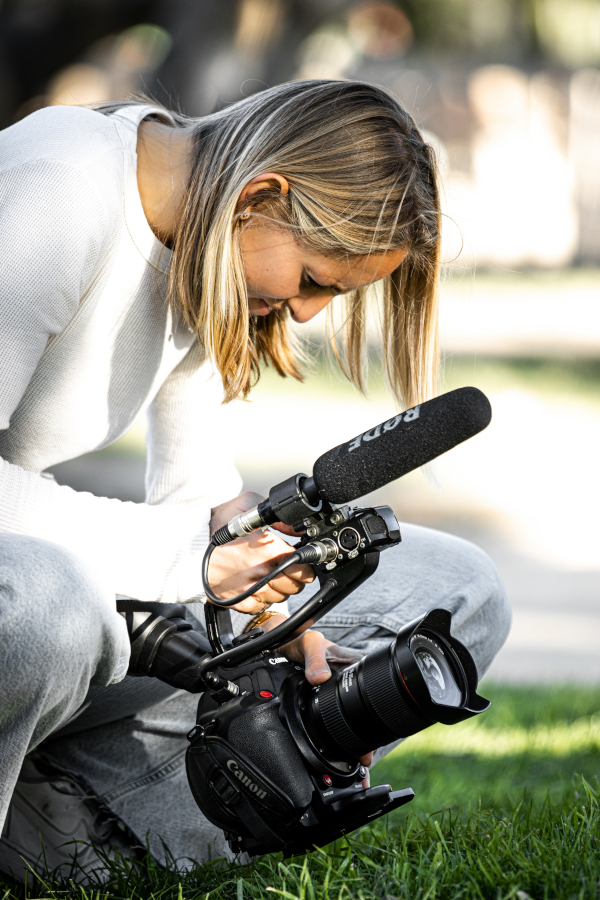
What was the shooting process like? How did you go about making the documentary?
It always consists of talking with the person, trying to know and obtain the maximum amount of information about them to know what kind of questions and information you want them to give you again in the interview that you’re going to record. I asked him the questions that interest me again, so that I had the information necessary for the voice-over and to organize the video with his own voice, because he talks about it himself. Once you reach this stage you have to transcribe everything he’s said and choose which parts of the interview you’re going to use for the documentary. Once you’ve done that and you have an idea in your head about how you’re going to tell the story, you have to think about how you’re going to show it. That’s when all the ideas come to you. And you prepare a list of shots that you want: a close-up of this plant, of his face, a slow motion of his face looking up… and you gradually plan it all.
What was really good with him is that Robert was already used to cameras. When I set up, because I can’t direct him, it’s a documentary and you adapt to the situation of the main character, he said to me: “Do you want me to go past now?” (laughs). Or he gave me ideas for recording. That’s what’s nice, when you reach this level of ease with your main character. And both of you are motivated by this same objective.
It’s a short which talks about sustainability. Did you also apply sustainability in the shoot?
As it’s a documentary made by a single person, I think that helps. You don’t have to transport a lot of people, or make 3,000 journeys. It has less impact. I also think a documentary is a low-impact way of recording because it already involves adapting to the life and situations of others.
Was the recording process longer or does the editing take more time?
In general what takes more time is writing the documentary before recording. All the preparation before the shoot, because you have to have a concept, an idea which guides your documentary, a narrative. Sometimes this takes me quite a long time. I think this happens with all documentaries. Then the editing is the most important. How you’re going to create a story which makes sense. But as it’s a four-minute documentary, I’d say the whole process lasted about two to three weeks.
What difficulties did you encounter on creating the short?
What was complicated with this project was finding the narrative, because it’s actually just someone on the roof of their house looking after their plants. There isn’t really a narrative in which there’s a goal, he wants to achieve it and we see that evolution of him doing so. The narrative is much more subtle. I wanted to show that it’s a cycle, that begins with the rubbish and in the end that rubbish becomes plants, which he gives to his neighbours and his neighbours throw out the rubbish and the rubbish returns to the earth. It’s a circular economy; that was the crucial part of the documentary for me and what took me the longest to think about. I love recording so it was very easy for me to record. Sometimes you also have lots of shots and the difficulty is knowing what to cut and not put in the film. It’s also a challenge to cut it down to four minutes.
You just won the award at the London Eco Film Fest in the ethical living and sustainability category. What does this award mean to you?
It means that my career is becoming a reality. I’m teaching myself that it’s possible to devote myself to this. The award consists of money to make your next project. If I can do this all my life and make a documentary, win an award which gives me money to make another, that would be incredible. I know that sounds idyllic; I’ll have to find other forms, but the award taught me that I’m capable and that in actual fact the work I do does have an impact and people are interested in what these stories and these people have to say. This motivated me a lot.
Is it difficult for someone starting out to gain access to festivals?
No. It’s very easy. Through FilmFreeway. It’s perfect. There they put all the festivals in the world, what type of festivals they are, the subject of the festival, whether or not it’s free. You can choose the options you want. In my case, I put festivals about nature or sustainability. You just have to prepare the dossier on the documentary and send it to the festival. It takes some time, but I think it’s very useful. You can’t count on festivals to earn a living, but I think that for documentary filmmakers it’s an important platform to show what you’re doing and if you’ve been recognized by such and such a festival.
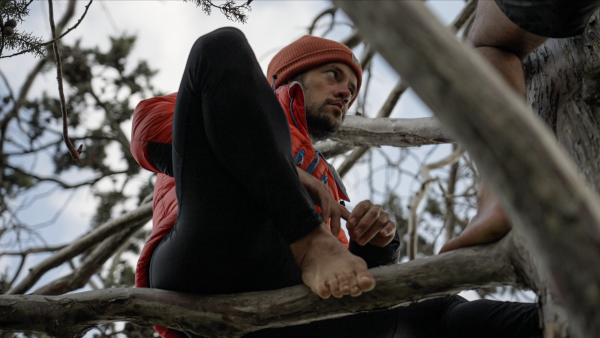
What other projects have you got in mind?
I’m now recording another documentary. I’m right in the middle of the production. It’s about a boy called Victor who promotes a different lifestyle in which he wants to integrate the mobility that we had when we were little and that we’ve forgotten on growing up. A mobility of all the joints of the body, of holding on. And doing all this in a natural environment and exploring this connection with trees again. He also gives classes on animal movements in trees. And it’s really interesting because his lifestyle revolves around this philosophy that we should integrate more into our daily life in order to move more. Because when we grow up we just tend to walk or sit.
In actual fact we sit more than we walk.
Exactly. And what he does is to give classes to people interested in reintegrating that connection with nature - and also with their own body - into their daily habits. Something that we had when we were little and we’ve lost. When I was younger I climbed trees, I fell, I was much more mobile and I didn’t care if I fell. I already found his story interesting, but it also has a challenge which is to be able to climb a redwood without any kind of help, with your bare hands and feet. He climbs like that, he ends up covered in mud, but he doesn’t care. It’s beautiful, because he goes back to his most natural state. I love that. I think I’m going to include that challenge at the end of this documentary to give it that narrative touch of let’s see if he succeeds.
